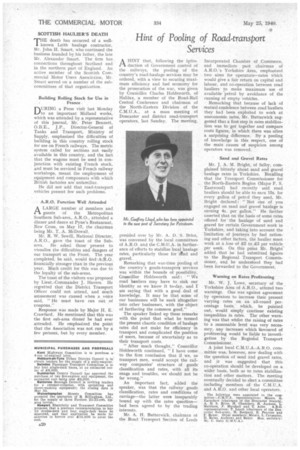Hint of Pooling of Road-transport Services
Page 22

If you've noticed an error in this article please click here to report it so we can fix it.
AHINT that, following the hat:roduction of Government control of the railways, the pooling of the country's road-haulage services may be ordered, with a view to securing maximum efficiency and fuel economy for the prosecution of the war, was given by Couricillot Charles Holdsworth, of Halifax, a member of the Road-Rail Central Conference and chairman of the North-Eastern Division of the C.M.U.A., at a mass meeting of Doncaster and district road-transport operators, last Sunday. The meeting,
presidedover by Mr. A. D. S. Brice, was convened by the local committees of A.R.O. and the C.M:U.A. in furtherance of efforts to stabilize local haulage rates, particularly those for send and gravel.
Remarking that war-time pooling of the country's goods-transport services was within the bounds of possibility, Councillor Holdsworth said : "We road hauliers may have to sink our identity as we know it to-day, and I am saying that with a good deal of knowledge. It may be that some of our businesses will be sunk altogether into other businesses, with the object of furthering the common good."
The speaker linked up these remarks with the point that what he termed the present chaotic condition of haulage rates did not make for efficiency in transport and complicated the position of users, because of uncertainty as to their transport costs.
" After much thought," Councillor Holdsworth continued, " I have come to the firm conclusion that if we, as transport men, would accept the railway companies' structure of goods. classification and rates, with all its snags and troubles, we should not be far wrong."
An important fact, added the speaker, was that the railway goods classification, rates and conditions of carriage—the latter were inseparably bound up with the rates question— had been agreed to by the trading interests.
Mr. A. H. Butterwiek, chairman of the Road Transport Section of Leeds Incorporated Chamber of Commerce, and immediate past chairman of A.R.O. 's Yorkshire Area, emphasized two aims for operators—rates which would give a fair return on capital and labour, and co-operation between road hauliers to make maximum use of available petrol by avoidance of the running of empty vehicles.
Remarking that because of lack of mutual confidence between road hauliers they had been exploited to work at uneconomic rates, Mr. Butterwick suggested that a first step in rates stabilization was to get together and compare costs figures, in which there was often a surprising difference. By a pooling of knowledge in this respect, one of the main causes of suspicion among operators was removed.
Sand and Gravel Rates Mr. J. A. M. Bright, of Selby, complained bitterly about sand and gravel haulage rates in Yorkshire. Recalling that the Transport Commissioner for the North-Eastern Region (Major F. S. Eastwood) had recently said road hauliers should be able to earn 15s. for every gallon of petrol they used, Mr. Bright declared : "Not one of you engaged on sand and gravel haulage is earning 4s. per gallon." He further asserted that on the basis of some rates offered for the haulage of sand and gravel for certain Government work in Yorkshire, and taking into account the limitation of journeys by fuel rationing and other factors, the haulier must work at a loss of £2 to RS per vehicle per week. On this point Mr. Bright added that he had submitted figures to the Regional Transport Commissioner, and he understood they had been forwarded to the Government.
Warning on Rates Profiteering Mr. W. J. Lowe, secretary of the Yorkshire Area of A.R.O., uttered two warnings. One was against agreement by operators to increase their present varying rates on an all-round percentage basis, which, he pointed out, would simply continue existing inequalities in rates. The other warning was that whilst the raising of rates to a reasonable level was very necessary, any increases which Savoured of profiteering would be liable to investigation by the Regional Transport Commissioner.
A joint local C.M.U.A.-A.R.O. committee was, however, now dealing with the question of sand and gravel rates, and it was suggested that this
co-operation should be developed on a wider basis, both as to rates stabiliza
tion and other matters. The meeting eventually decided to elect a committee including members of the C.M.U.A. and A.R.O. and other local operators.
The following were appointed to the committee:—C.M.V.A. representatives: Messrs. 0.. Earnshaw (chairman of the Doncaster branch}, A. D. S. Brice. H. Chambers, H. Jackson, L. Malehana, F. Marshall and T. Ashe. A.R.O. representatives: T. Leach (chairman of the Donraster Sub-steal, H. Redgard, R. Pearson and F. Baker. Other members: Messrs. L. Carpenter, D. Bates, Andrews and Baker. Hon, secretary: Mr. C. Oaks (CAL'U.A.),




























































